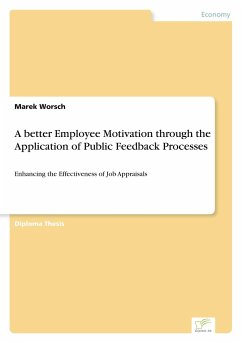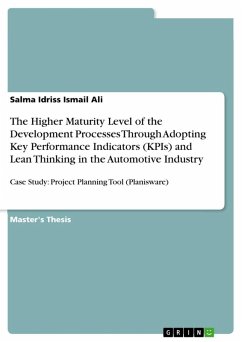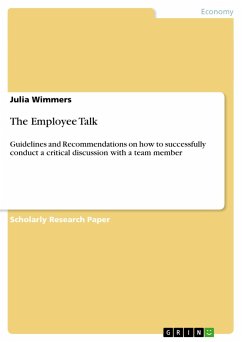Diploma Thesis from the year 2004 in the subject Business economics - Personnel and Organisation, grade: 1,3, University of Applied Sciences Berlin (Wirtschaftswissenschaften I - Fachbereich 3, Betriebswirtschaft), language: English, abstract: Inhaltsangabe:Abstract:
The Diploma Thesis at hand considers the interdependence of employee motivation on the one and feedback and job appraisal processes in organisations on the other hand.
Basically, today s job appraisal procedures have one major disadvantage. They rarely comprise more than a subjective assessment of employee performance. This assessment is normally carried out by an employee s superior. In this thesis, it will be argued that through the dynamics of bias and politics in organisations, the validity of job appraisal information is significantly distorted. Hereby, the effectiveness of job appraisals is affected negatively since they cannot serve as a reliable basis for personnel decisions. But more important, the distorted information is likely to result in overseeing or ignoring an individual s achievements in the workplace. Lack of appreciation of one s effort and, additionally, the feeling of being treated inequitably compared to co-workers may erode an employee s motivation. However, in a world of accelerating globalisation and thus increasing competition, a motivated workforce is the key to an organisation s success.
The thesis will propose a potential solution for this dilemma - public feedback. This means that the information gained through job appraisals will not be discussed one-on-one , involving only superior and subordinate. Rather, the discussion is extended to the latter s peers. The prerequisites for and the proceeding of this approach to employee evaluation will be provided. Also, the thesis covers the analysis of a survey. This was accomplished to test the acceptance of a public feedback process among a sample of white collar workers. The results show a general acceptance and appreciation of the idea of feedback in public.
Inhaltsverzeichnis:Table of Contents:
List of Charts and TablesIII
List of ChartsIII
List of TablesIII
AbbreviationsIV
1.Introduction1
1.1Choice of the Topic1
1.2Problem and Objectives2
1.3Methodology3
2.Employee Motivation5
2.1Definition5
2.1.1Origin of the Term5
2.1.2Motivation in the Field of Business Administration5
2.2The Need for Employee Motivation7
2.3Theories on the Content of Motivation10
2.3.1Motivation as a Hierarchy of Needs11
2.3.2Motivation as a Twofold Phenomenon13
2.3.3Money as a Motivator15
2.3.4Conclusions16
3.Feedback18
3.1Definition of Feedback18
3.1.1Origin of the Term18
3.1.2Feedback in the Field of Business Administration18
3.1.3Job Appraisals as Information Basis for Feedback19
3.2The Need for Feedback21
3.3The Need for Public Feedback26
3.3.1The Significance of Equity26
3.3.2Sources for Inequity Resulting From Feedback and their Consequences28
3.3.2.1Distortion Due to Errors Out of the Appraisal Process29
3.3.2.2Distortion Due to the Person of the Assessor30
3.3.2.2.1The Affect of Appraisals by Bias30
3.3.2.2.2The Affect of Appraisals by Politics in Organisations32
3.3.2.3The Consequences of Distorted Feedback35
3.3.3Implications37
3.4Conclusions39
4.A Model for a Public Feedback Process41
4.1Similar Approaches in Practice41
4.1.1Yellow Springs Instruments (YSI)41
4.1.2National Health Service (NHS)42
4.1.3Critical Discussion43
4.2The Development of the Model45
4.2.1Basic Prerequisites45
4.2.2The Job Appraisal46
4.2.2.1Superior-appraisal47
4.2.2.2Peer-appraisal48
4.2.2.3Self-appraisal49
4.2.3The Public Feedback Discussion50
4.3Acceptance of the Model in Practice53
4.3.1Cond...
Hinweis: Dieser Artikel kann nur an eine deutsche Lieferadresse ausgeliefert werden.
The Diploma Thesis at hand considers the interdependence of employee motivation on the one and feedback and job appraisal processes in organisations on the other hand.
Basically, today s job appraisal procedures have one major disadvantage. They rarely comprise more than a subjective assessment of employee performance. This assessment is normally carried out by an employee s superior. In this thesis, it will be argued that through the dynamics of bias and politics in organisations, the validity of job appraisal information is significantly distorted. Hereby, the effectiveness of job appraisals is affected negatively since they cannot serve as a reliable basis for personnel decisions. But more important, the distorted information is likely to result in overseeing or ignoring an individual s achievements in the workplace. Lack of appreciation of one s effort and, additionally, the feeling of being treated inequitably compared to co-workers may erode an employee s motivation. However, in a world of accelerating globalisation and thus increasing competition, a motivated workforce is the key to an organisation s success.
The thesis will propose a potential solution for this dilemma - public feedback. This means that the information gained through job appraisals will not be discussed one-on-one , involving only superior and subordinate. Rather, the discussion is extended to the latter s peers. The prerequisites for and the proceeding of this approach to employee evaluation will be provided. Also, the thesis covers the analysis of a survey. This was accomplished to test the acceptance of a public feedback process among a sample of white collar workers. The results show a general acceptance and appreciation of the idea of feedback in public.
Inhaltsverzeichnis:Table of Contents:
List of Charts and TablesIII
List of ChartsIII
List of TablesIII
AbbreviationsIV
1.Introduction1
1.1Choice of the Topic1
1.2Problem and Objectives2
1.3Methodology3
2.Employee Motivation5
2.1Definition5
2.1.1Origin of the Term5
2.1.2Motivation in the Field of Business Administration5
2.2The Need for Employee Motivation7
2.3Theories on the Content of Motivation10
2.3.1Motivation as a Hierarchy of Needs11
2.3.2Motivation as a Twofold Phenomenon13
2.3.3Money as a Motivator15
2.3.4Conclusions16
3.Feedback18
3.1Definition of Feedback18
3.1.1Origin of the Term18
3.1.2Feedback in the Field of Business Administration18
3.1.3Job Appraisals as Information Basis for Feedback19
3.2The Need for Feedback21
3.3The Need for Public Feedback26
3.3.1The Significance of Equity26
3.3.2Sources for Inequity Resulting From Feedback and their Consequences28
3.3.2.1Distortion Due to Errors Out of the Appraisal Process29
3.3.2.2Distortion Due to the Person of the Assessor30
3.3.2.2.1The Affect of Appraisals by Bias30
3.3.2.2.2The Affect of Appraisals by Politics in Organisations32
3.3.2.3The Consequences of Distorted Feedback35
3.3.3Implications37
3.4Conclusions39
4.A Model for a Public Feedback Process41
4.1Similar Approaches in Practice41
4.1.1Yellow Springs Instruments (YSI)41
4.1.2National Health Service (NHS)42
4.1.3Critical Discussion43
4.2The Development of the Model45
4.2.1Basic Prerequisites45
4.2.2The Job Appraisal46
4.2.2.1Superior-appraisal47
4.2.2.2Peer-appraisal48
4.2.2.3Self-appraisal49
4.2.3The Public Feedback Discussion50
4.3Acceptance of the Model in Practice53
4.3.1Cond...
Hinweis: Dieser Artikel kann nur an eine deutsche Lieferadresse ausgeliefert werden.








